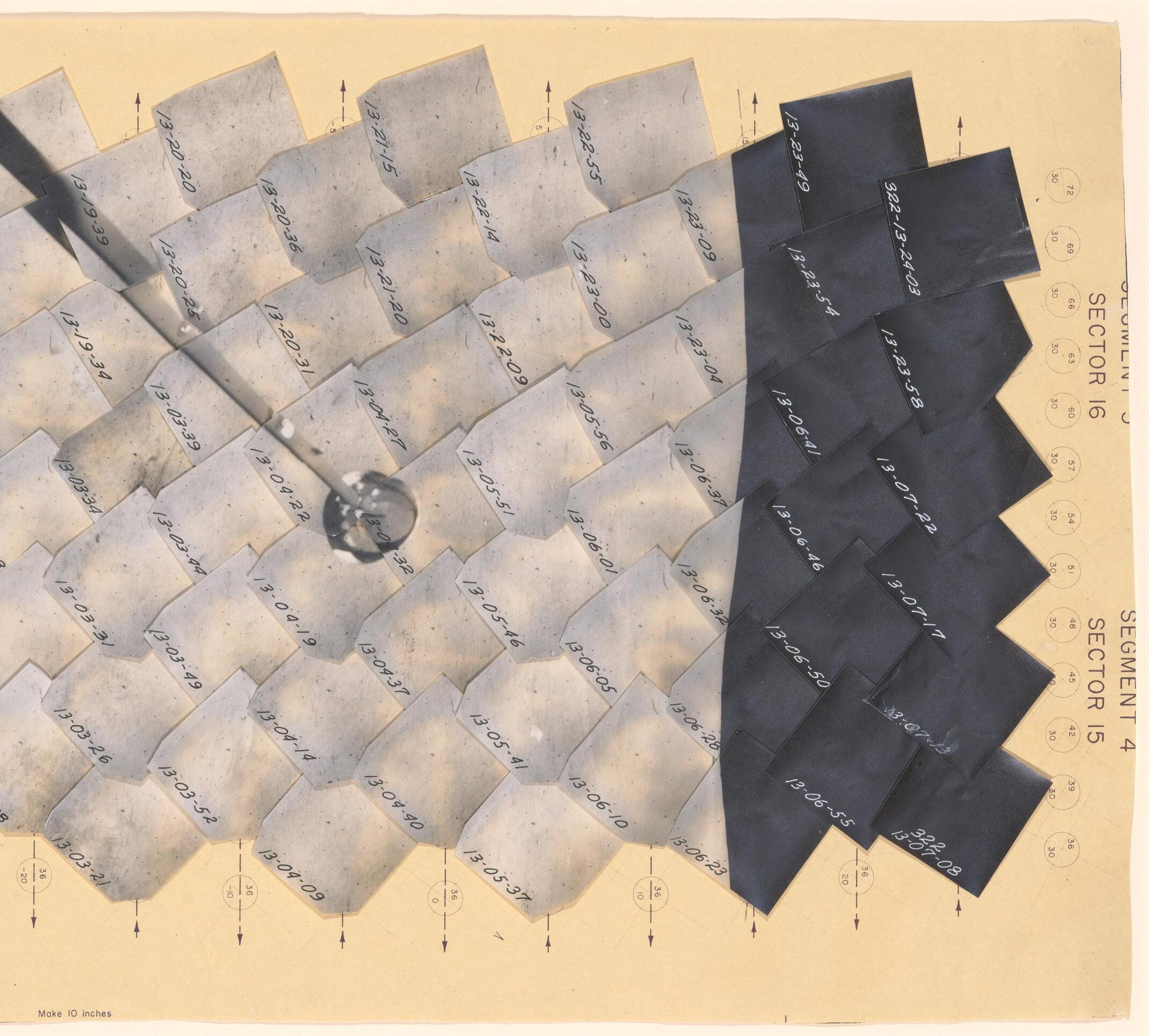

THE LIT
The full Spring 2024 issue—with more stories, poetry, nonfiction, and art—is available at http://thelitmag.com. You can also read contributors’ bios and interviews with the writers and artists from this issue. Submit to next year’s edition at thelitmag.com/submissions.
Cover image: A mosaic of mages of the lunar terrain from the unmanned 1966 Surveyor Expedition series. Images of the moon were taken by a lunar probe that beamed them back to monitors at the Jet Propulsion Laboratory, where they were photographed and assembled into the composite seen on the cover. “Day 3, Survey U, Sectors 15 and 16,” United States Geological Survey, National Aeronautics and Space Administration, 1967, Courtesy the Metropolitan Museum of Art, Open Access.
LIT THE
THE LITERARY AND ART MAGAZINE OF LAGUARDIA COMMUNITY COLLEGE | SPRING 2024
Acknowledgements
e Lit is a production of the Spring 2024 Literary Magazine Internship, English 288, at LaGuardia Community College, CUNY. All writings and artworks were read and evaluated by student-interns and the faculty advisor, Christopher Schmidt. Special thanks to Sonia Rodriguez, who read submissions for the 2024 Casa de las Américas Art and Writing Contest, as well as Noam Scheindlin, Irwin Leopando, Sylwia Prendable, and former faculty advisors Bethany Holmstrom and Lucy McNair for their support. Also thanks to LaGuardia’s art faculty who circulated the call for submissions among their students, and to the Print Center sta .
Editorial Roles
Tammy Browne: Social Media/Marketing Co-Director
Kevin Cruz: Copy Editor, Web Designer, Fiction Editor
Victor Garate: Web Designer and Nonfiction Editor
Daraen Kyi: Web Designer and Arts Editor
Danaiya Odom: Social/Marketing Co-Director and Poetry Editor
Vanesa Paolino: Social/Marketing Co-Director and Poetry Editor
Joel Pazmiño: Web Co-Editor-in-Chief and Fiction Editor
Devika Shewpaltan: Web Co-Editor-in-Chief and Poetry Editor
Ethan Velez: Print Editor-in-Chief, Arts Editor, Nonfiction Editor
Christopher Schmidt: Faculty Advisor
Casa de las Américas and The Lit LGBTQIA+ Art and Writing Contest Winners
Art awards
“Fortune” by Jino Dority
“Summer Memories” by Len Rivera
Poetry awards
“Treasure” by Isabella Brosi (online)
“We Are the Children” by Saturn Lawson
“Self Love” by Matthew Pacuruco (online)
Prose award
“Cathedrals” by Ethan Velez
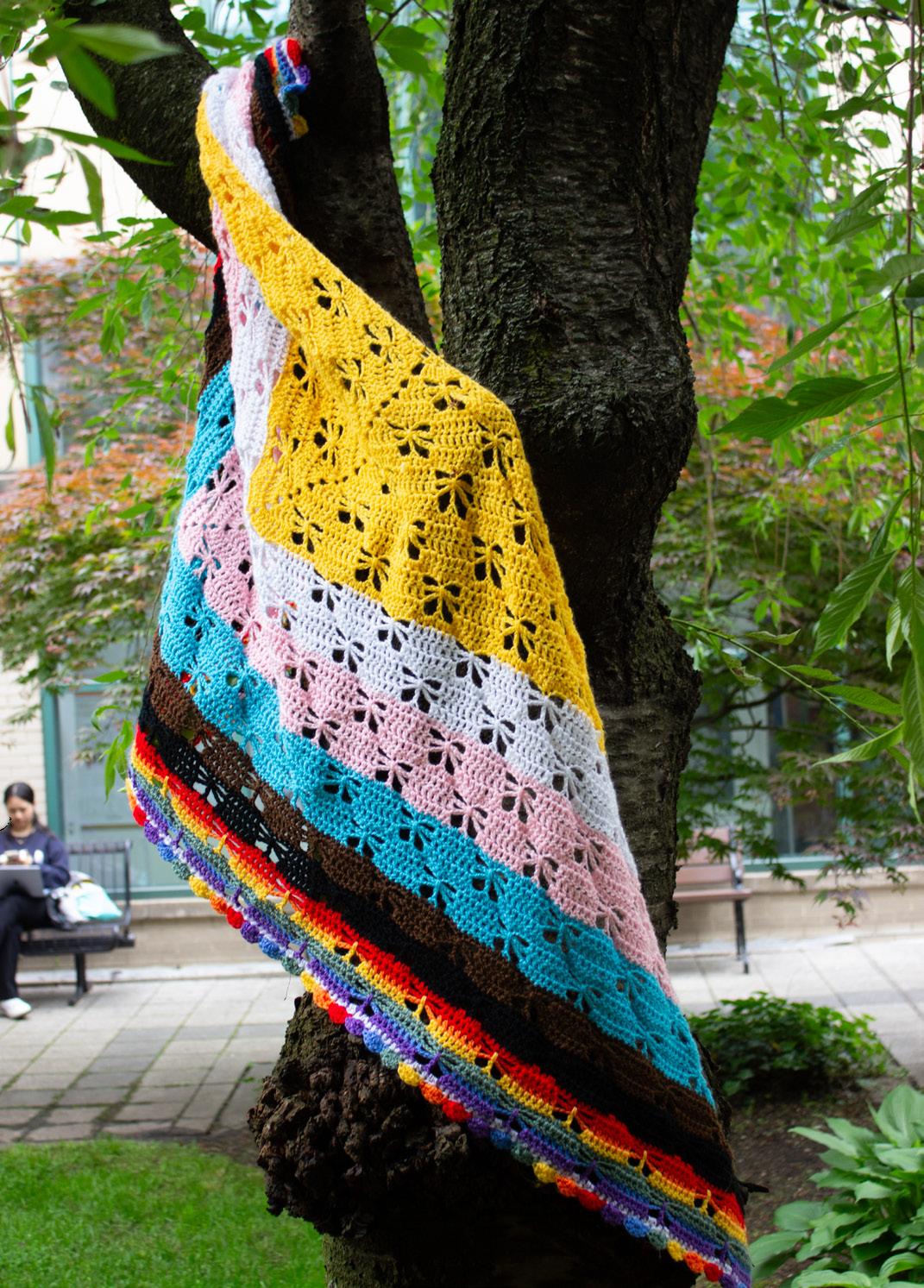
“Wings of Love,” Alondra Barrales (shawl); photo by Ethan Velez
Table of Contents
I’ve been depressed for so long that I’ve forgotten what a spotless mind is like.
She and I
Victoria Segarra
She wears warm, vibrant colors. I wear cold, muted ones. Her voice is loud and distinct. She o en asks me to repeat myself because I’m so quiet. I swipe my card at the station. She hops the turnstiles. She can eat the same meal every day without complaint. I start to gag a er a week of the same food. She can hack gaming consoles and x a computer. Technology infuriates me. I talk to my mother every day. She has gone months without a word to hers.
I’ve been depressed for so long that I’ve forgotten what a spotless mind is like. She has never had depression and winces at my descriptions of it. I loathe myself. She is a self-proclaimed narcissist. She likes politics and the news. I nd politics terribly disheartening. She has optimism. My sense of optimism died years ago, hence my disdain of the news. She thinks things will eventually get better. I think the world is shit and it’s only getting worse.
She does get sad. When she talks about her family’s indi erence towards her, her eyes get glossy and her voice gets that familiar thickness of anguish. She hardly sees them and they seldom remember her. She is the oldest and the least favorite child. I am the youngest and I’m spoiled rotten.
Her room is messy, with bottles and cups on almost every at surface. My room is neat, my oors empty. Messy places make me anxious and she knows this, so she makes sure to clean her room before I come to visit. Sometimes her room is still messy and I nish cleaning the rest while she is at work because I know she hates cleaning. When we smoke together, she holds the lighter for me because she knows I’m
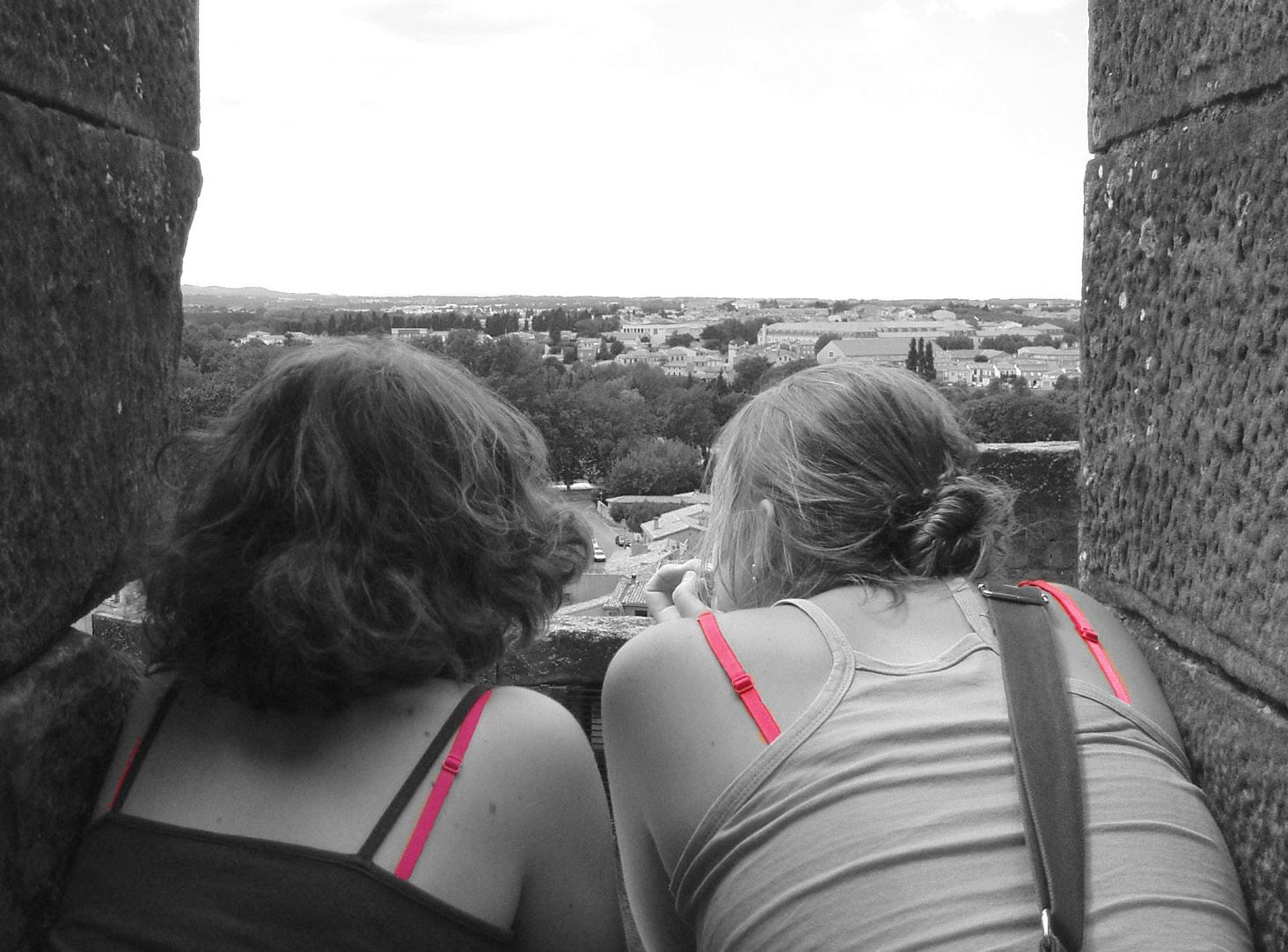
scared of burning myself.
We’re very di erent. At rst glance, we are an odd couple: she with her big, aming red hair and long legs and me with my dark brown hair standing nearly a foot shorter. But the things we do have in common are things that we have in common with no one else. Neither of us believes in God or astrology or crystals. We nd each other’s sense of skepticism refreshing.
I’m creative. I like to write and occasionally draw. She likes to consume content and says she is glad she doesn’t feel compelled to create. She thinks it’s tiresome. I’m studying creative writing because writing is one of, if not the only thing, I’m good at. I brie y thought about becoming a writer or maybe working in publishing, but I’ve since realized that I have no desire to do such a thing. I think it’s tiresome. I have not a single idea for a story, while she has so many she doesn’t know what to do with them all.
She likes to talk. I like to listen. I write much better than I talk. When I talk, I stumble over my words, but when I write I can communicate all of my feelings clearly. Her words are con dent, her voice deep and warm and certain.
She picks her nose. She says this is a deal breaker for a lot of people. I nd it a disgusting but minor issue. It amazes her that I put up with it. I might have been one of those people once, before I had ever fallen in love, but love puts things into perspective.
To read an interview with LaGuardia alum Victoria Segarra by one of The Lit’s editors, visit http://thelitmag.com.
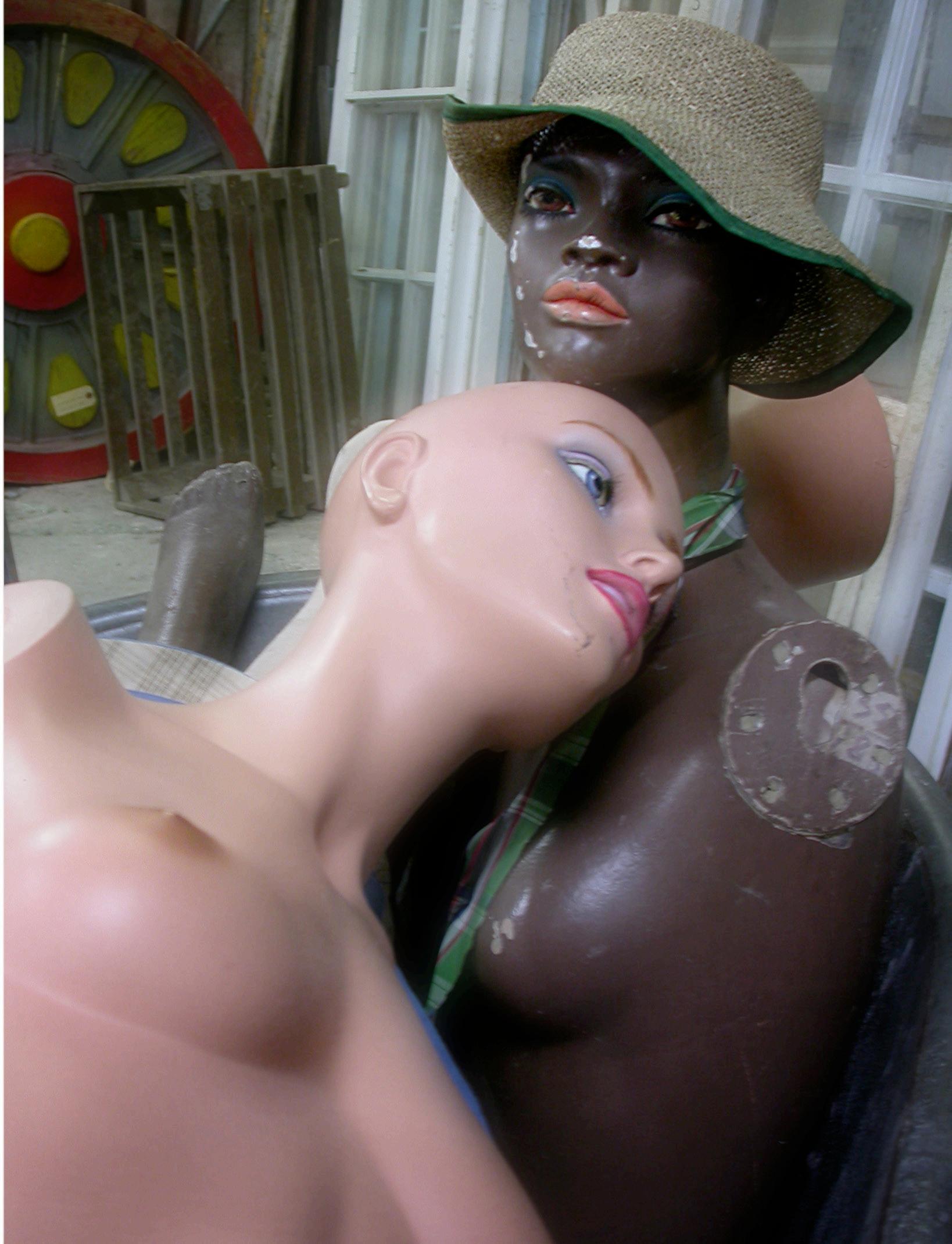
Three Short Fictions
Jennifer De La CruzWater, Light, Dirt
Plants need three things to grow: water, light, dirt. She has given each plant these things in varying amounts. ey are de ant and refuse to root. e Crassula bends and dips waywardly. e maroon blooming over the green indicates a sunburn. e Delosperma is thin, leggy, and uncertain like a teenage girl. e Nanouk plays coy—it blushes virgin pink but will never allow her to see it ower. She spends her time chasing sunlight. She loses sleep searching for deals on humidi ers and dreams of fog. If plants need just three simple things to grow, why won’t they? e ring of the telephone interrupts the watering schedule. It is her mother calling, asking about her womb.
El regalo mejor
We were all at mamá’s 80th birthday party. ere were sun owers made of meringue on her cake. We sang happy birthday in two languages because we are in America now and we won’t let her forget it. We ignored the heavy, funereal dress she chose. We ignored the trap door expression on her face. We ignored her hand on her hip as she tilted toward the single candle she blew out with a sigh. 80 years: a lost mother, a dictator, a dead husband, at the mercy of knees that won’t let your feet run away. All culminating into estedíaglorioso. We should all be so lucky.
Loved and Wanted
A friend of mine was molested by all the men in her family who had the opportunity to babysit her. All of them. She could never relax around her own brother. She watched him carefully, anticipating his inherent depravity. Her panic expanded alongside her uterus. She wept with relief when she found out the sex. I watched her change the baby’s diaper—delicate pink and purple owers with smiley faces on them. I wondered if the baby was born of euphoria, but I did not ask. She looked at her tiny vagina and smiled. “I would have drowned her if she were a boy,” she cooed.
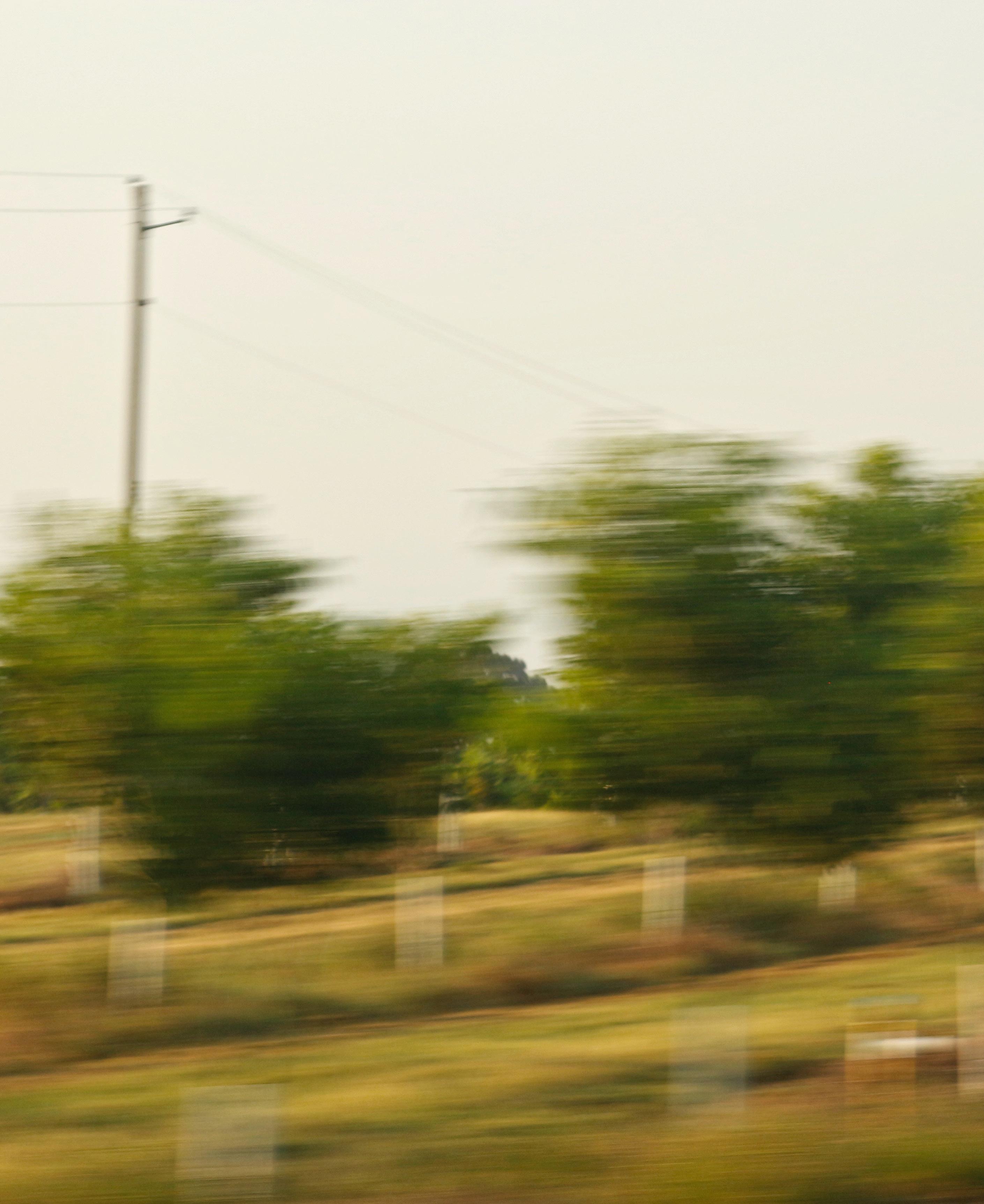
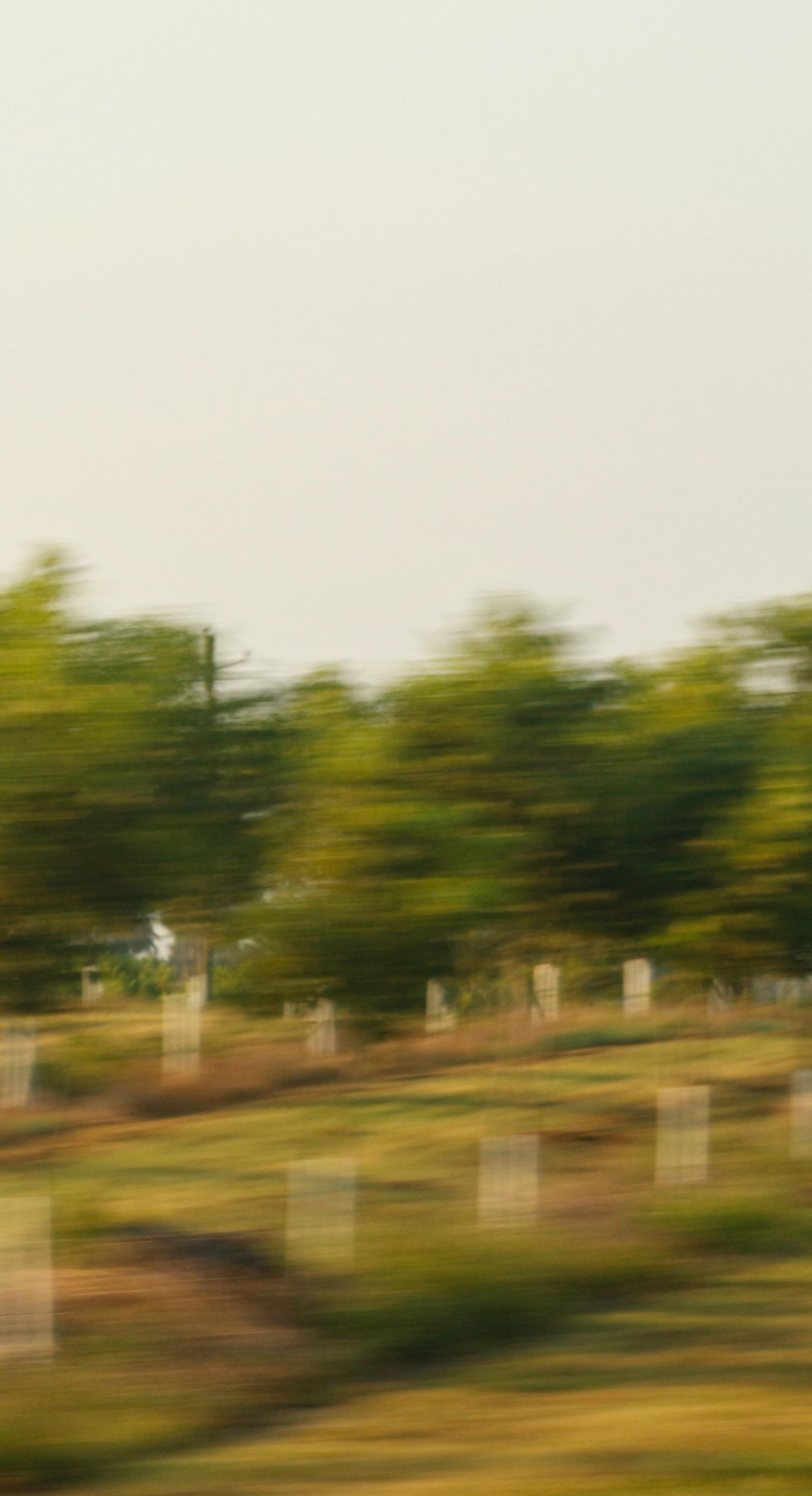
“Georgia Peach” by Isabella Allwood. 2023. To read an interview with Isabella Allwood, visit http://thelitmag.com.
On Openness
Victor Garate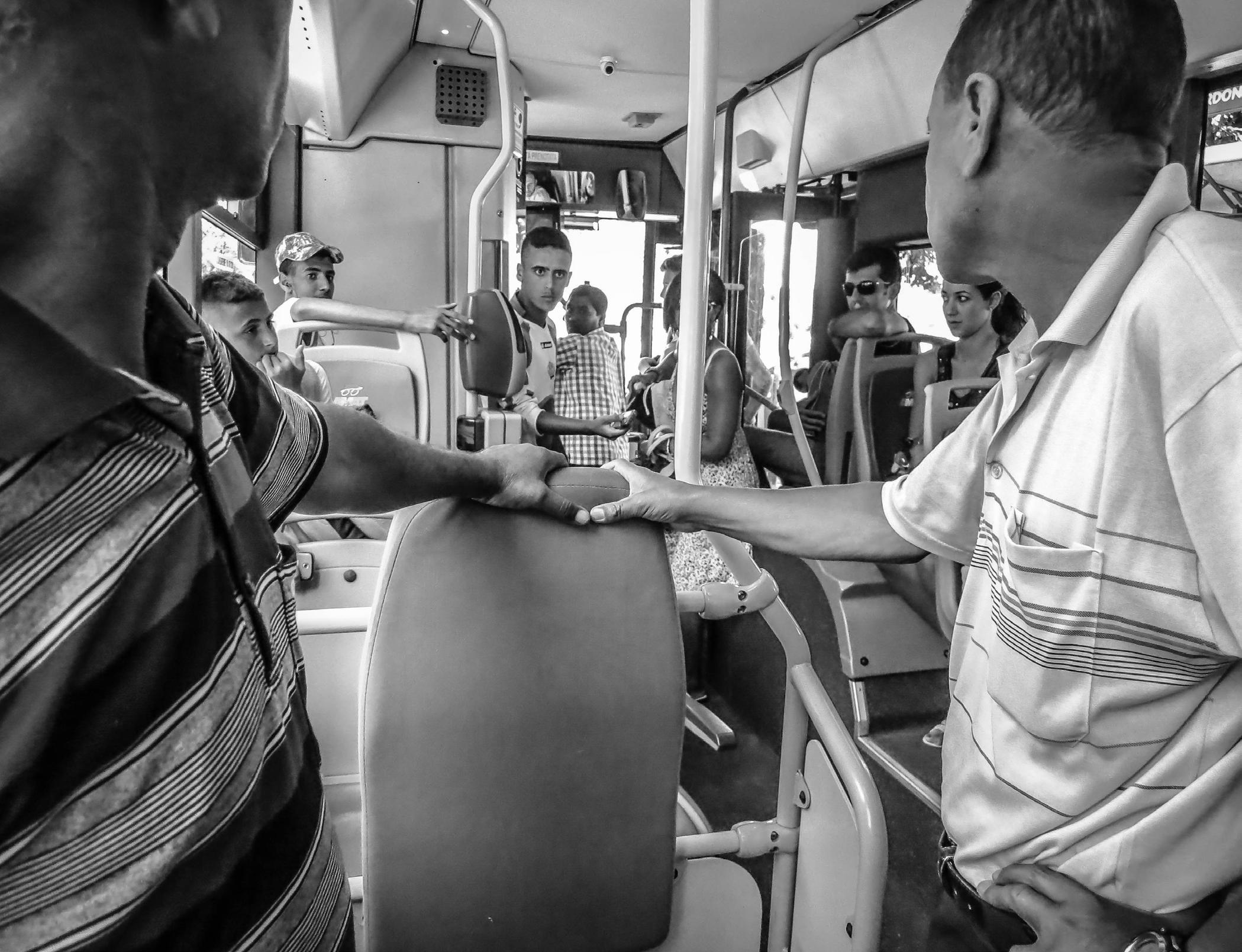
Istood rooted in place when I saw my dad waiting for me outside my high school building, his hands stu ed in his pockets to stave o the October chill. It felt strange to see him again a er I, a thirteen-year-old at the time, believed he would be gone forever. e only reason I didn’t feel overwhelming shock was because I had seen him earlier that morning as I walked with my cousin to school. My dad stood by the front door, wearing the same beanie and jacket he wore now, speaking to a school sta member, most de nitely asking about me. He didn’t notice me then. I turned my face away from him as I hurried inside the building. at was when shock and disbelief hit me. And throughout the school day, the thought of my dad waiting for me outside loomed in my mind, and so did the fear that accompanied that thought. I told my cousin as we scaled the school’s narrow staircases, “I think I saw my dad outside.”
Seeing him again, I almost wanted to walk away. Stroll straight past him and pretend I didn’t know him. But I didn’t do that. I moved toward him, slowly, with my hands in my pockets, taking in a deep but quiet breath.
As he usually did when greeting me, my dad held the back of my neck and planted a kiss on my forehead. I didn’t greet him back.
“Hi, son,” he said. I can’t remember for certain that he was smiling.
“Hi,” I said. And then, “Where have you been?”
“Let’s talk somewhere in private.”
Although I didn’t say it (and in fact, I would never tell him this), I thought about the month in which I truly thought I would never see him again. e month in which I called him many times, hoping to hear his voice but only hearing the automated one from his voicemail. e month in which, despite insisting to my mom that I was okay and that I didn’t need to talk about it, I broke down in tears while on a phone call with a friend. e month in which I worried about how my
As he usually did when he greeted me, my dad held the back of my neck and planted a kiss on my forehead. I didn’t greet him back.
mom was going to pay the rent without my dad’s income, so I told her, “I don’t want to go to soccer practice anymore,” and she responded, adamantly, “You’re going to that practice.”
But it was also the month in which I felt free. I could, without preamble, hang out with my friends. As I was growing up, my dad would o en question who and when I hung out. Whenever he questioned the type of people I hung out with, I’d employ the same tired defenses like, “Don’t worry, they are good people,” and, “they would never get me into drugs or alcohol. I’m not into that stu anyway.” It’s obvious to anyone why I enjoyed this new found freedom. But I kept these feelings hidden away; even, to a certain extent, from myself.
My dad and I walked to the corner store across from school and stopped beneath its awning. I can’t remember all the words that were said, only snippets. But I know at some point I asked,
Why did you leave? Why did you lie? And then sadness overtook me. I was sobbing against him, feeling the fur of his jacket, my breathing coming shallow and fast. I didn’t care that students from my school were walking by, and that some of them would recognize me.
As if to appease me, he’d say things like, “I came back because I care about you and your brothers,” and, “If I was a bad father, I wouldn’t have come back at all.”
Over and over I repeated the same questions. Why did you leave? Why did you lie?
At some point, my dad wrapped his arms around me. But when I looked up at his face, I didn’t really see a sympathetic expression there. He looked how he o en looked whenever he was stuck and didn’t know what to say, his mouth slightly open.
e thing was, I knew why he le . I knew he had gone back to his home country of Ecuador to wed the mistress he swore he never had. But his refusal to answer my questions angered me. I wanted him to rationalize his decision to leave behind my brothers and I.
Finally, my dad said, “Don’t worry. I will tell you everything one day.”
He wouldn’t. e following week as my brother and I sat across from him at a local cafe, we confronted him about his lying. He wouldn’t really answer. In fact, he would deny ever promising to give me answers in the rst place. Instead he said, “I only said we were going to talk, that’s all.”
e one thought that came to me then, and that persisted a erward, was, How could someone lie so much? I cried in that cafe, too.
I suppose there was not much else to explain anyway. He le because he loved someone else, and he didn’t say anything because he didn’t have to. My mom and dad’s relationship was broken long before he le . He just nally decided to act. He decided to ditch his age-old idea that a mother and a father were needed in a child’s life, even if the relationship between the mother and father was toxic. Even if the relationship between the mother and father had long since turned abusive.
I now know (or I think I know) that by lying to me, he was trying to avoid confronting his own choices. Although he would never admit it, he didn’t want to feel shame and he certainly didn’t want to deal with my pain. He didn’t know, and still doesn’t know, how to maneuver other people’s feelings. How to reconsider his own choices a er someone else challenges them. So he lied. He lied about telling the truth.
“Sunnier Morning” by Len Rivera, 2024.
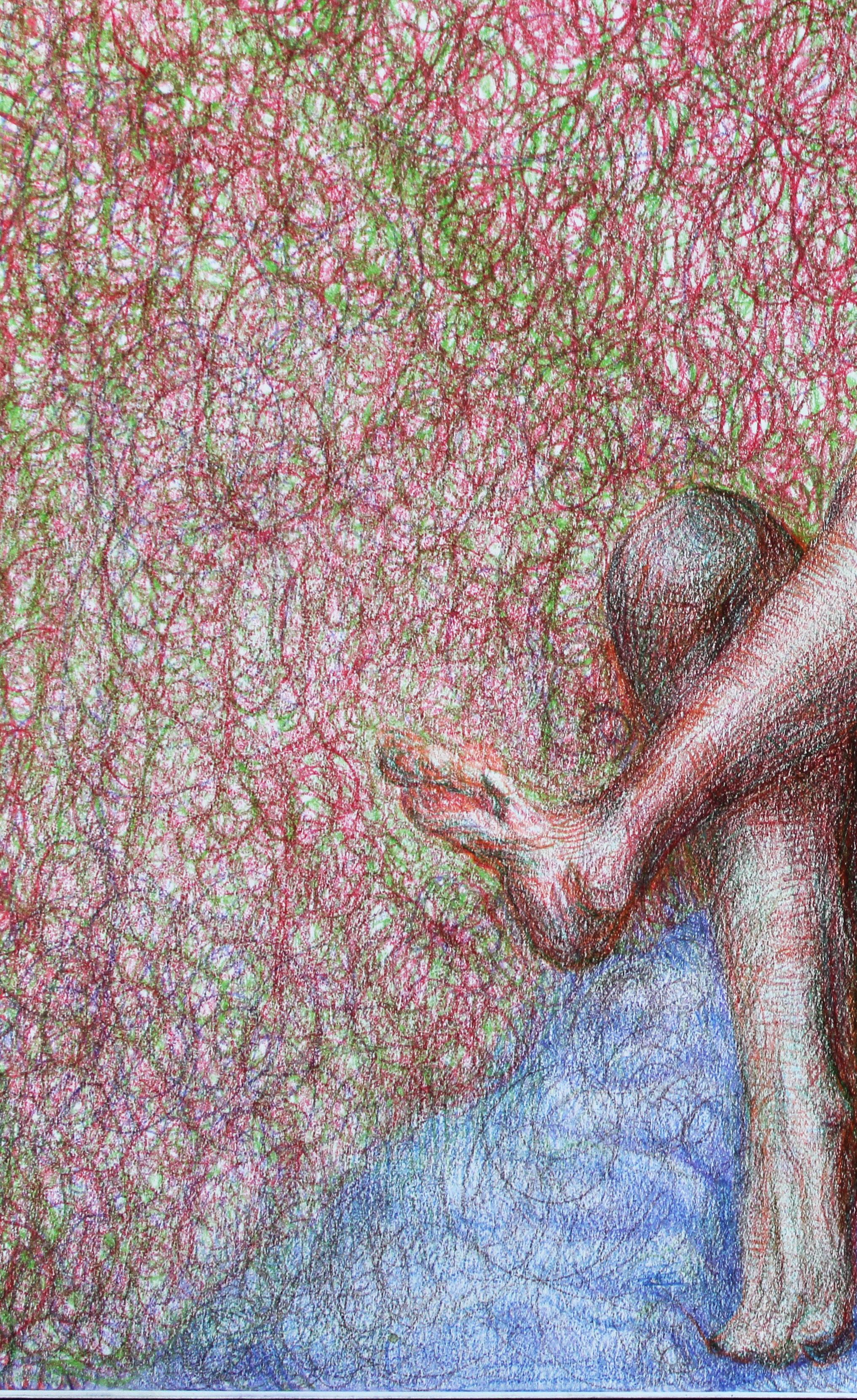

Mango from Bongo
Raisa Zannat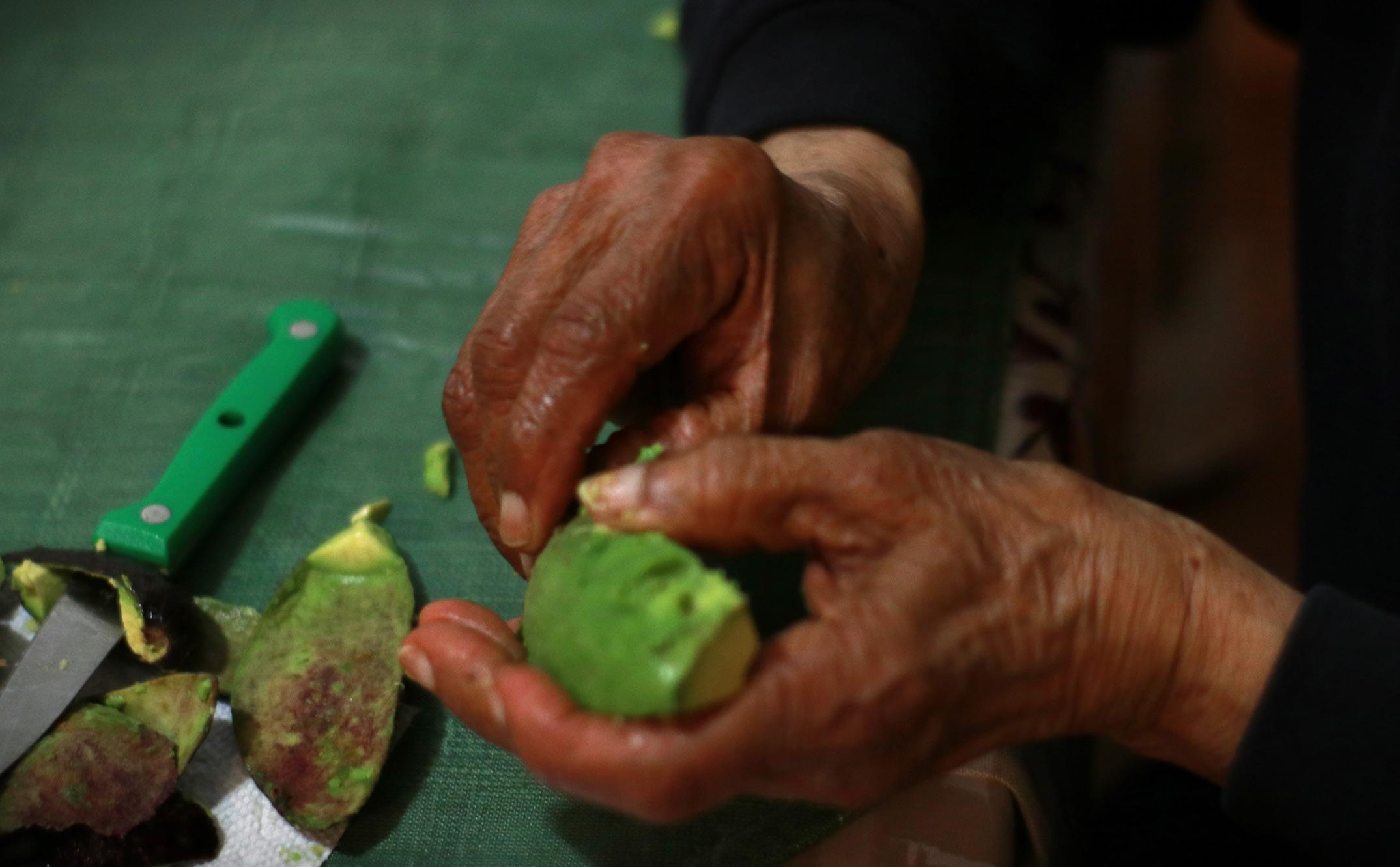 Photograph: “Mama Nieve and her Aguacate” by Joel Pazmiño, 2023.
Photograph: “Mama Nieve and her Aguacate” by Joel Pazmiño, 2023.
My grandmother Razia Khaleque was a strong and resilient woman. She lost her husband at the tender age of 23. A er the demise of my grandfather, she was le to raise my father and two uncles by herself. She worked as a single mother for most of her life. At a stage in her life, she decided to remarry one of her coworkers and faced scrutiny from most of her family members. Due to her marriage, my father ran away and started living with his grandparents, and my uncles o en made her feel guilty about the decisions she made for herself.
On the other hand, my relationship with my grandmother was quite di erent. It was beautiful. She loved me unconditionally and I did her. I considered her to be my safe haven. I remember waiting for weekends to arrive. at would mean we could visit her, or she could come over to our place. My mother says that my grandmother always wanted a daughter for herself, but it never happened. erefore, she had a strong a ection for me. But I believe my grandmother was living my father’s childhood through mine. e times she couldn’t spend with my father she was trying to make up for those through me. When I was in sixth grade, I remember transferring to a school near my grandmother’s house. at summer was extraordinarily special for me. I remember her waiting for me outside school every day to walk me home. She used to cut up mangoes and bring them to me during my break because she knew how much I loved them. At times she would bring multiple containers of beautifully peeled and cut mangoes so that my friends and I could share.
Speaking of mango, my grandmother had the perfect little mango tree in her front yard. Comparatively small but reaching the roof of her one-story home. e branches would stoop over to the roof and cover half of its space. During the spring, yellow and orange owers would cover the tree. And in summer those owers would turn into
little green mangoes. During the rainy season, the area surrounding the tree would be lled with mangoes that couldn’t stand the weather. O en, I would sneak some salt and red chili from my grandmother’s kitchen to eat raw green mangoes straight from the tree. I would eat them while sitting on the edge of the roof with my legs dangling over the sides of the cement brim. e mangoes from my grandmother’s tree had a very distinctive taste that reminded me of rainwater and wet soil. It always smelled fresh and had the perfect balance of sourness and fruitiness. e neighbors had a mango tree as well but their mangoes weren’t as tart as ours. I was strictly prohibited from going to their side or fetching mangoes from their tree, as it was considered a bad manner. But they would stop by with a bag of mangoes every other season as a courtesy and I appreciated them.
Growing up I have always seen mangoes as an essential item in our food list. I have seen my grandmother make pickles out of them. She made spicy pickles by marinating raw mangoes with various spices and dipping them in mustard oil. She also made translucent candied mangoes that looked like edible crystals in a jar. Various kinds of mango preserves have always been displayed in our dining hall like a bunch of prized possessions. No matter the season there was always a mango delicacy to o er. I have seen my father eat ripe mangoes mushed with rice and milk. I have seen my aunts make fruit leathers with sun-dried mango puree which was meant to last for a while, but could never because it would be devoured instantly. I have eaten lentil soup made with seasonal sour mangoes which tasted divine. One time I visited the suburbs and a girl from the neighborhood brought me a jar of dried sliced mangoes that looked like mushrooms. Upon asking she mentioned it was made from mangoes that fell o the tree during a storm. It was then washed with salt, sliced, and air-dried. She taught me how to enjoy it mixed with red chile and salt. Even though hesitant at rst a er tasting it, I remember having it every other evening for the rest of the season.
Considered the king of fruit in the South Asian region, mango not only plays a vital role within the food system. It also in uences the culture, contributes to the economy, and works as a pathway to people’s hearts. Every mango season it is expected for the oldest son-in-law
of the family to bring in freshly harvested mangoes into the in-law’s home. It is one eccentric practice of South Asian culture. Friends send friends baskets of mangoes as a friendly gesture. Neighbors share mangoes that grow in their individual trees. e economy ourishes tremendously with all the exports that take place during the season. Happiness is a sense of well-being and contentment. Di erent people feel happiness for di erent reasons. For me, it was eating; for my grandmother, it was feeding me. She used to say she feels full every time she sees me smile a er eating. Maybe her contentment did rely on my ful llment. All the e orts she put into making me feel comfortable and safe throughout the small amount of time she was with us le me with a sense of responsibility. It taught me that love and kindness are meant to be shared. It is a teaching that grows within me every passing year. Just like her mango tree that is growing and spreading love through her mangoes. Even though my grandmother is not here, her essence still lingers, and her love is still felt. Every passerby who walks in front of her house carries a bit of my grandmother’s love with them. Everyone who enjoys the mangoes relishes a part of the love that my grandmother had to o er. And every time I get a whi of rain and wet soil, it takes me right back to my grandmother’s arms. Where love is abundant and I am safe.
Every passerby who walks in front of her house carries a bit of my grandmother’s love with them. Everyone who enjoys the mangoes relishes a part of the love that my grandmother had to offer.
Don’t Do That, Rosa
Ethan Velez
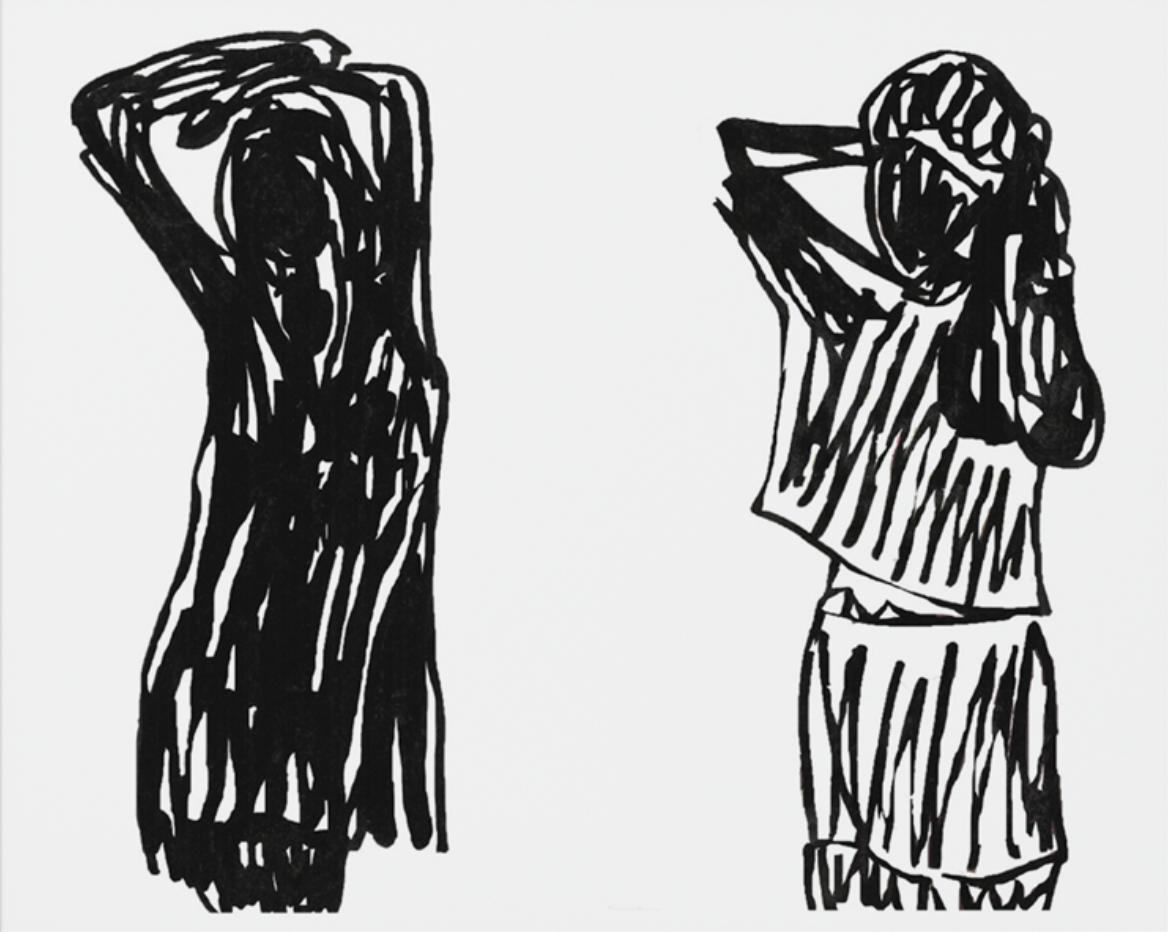
Is my husband cheating on me?”
She gives me this look. She was expecting this question, but she was still surprised I asked. She looks like my mother. at is the rst bad indication about this place. My friend Katrina swore by it, though, she even o ered to pay for it. I wouldn’t let her because I wanted her to know I trust her. ere is a shadow in the corner of the room that disappears when I notice it.
“I thought you’re supposed to shu e the cards,” I say atly, the way I speak to my mother. is woman is wearing face jewelry and an oversized Yankees t-shirt. She sco s at me, but she also smiles. She shu es her deck of paper cards and six of them fall out. She reveals ten of cups, ace of wands, the chariot, the devil, the magician, and two of pentacles. I smile at her.
“It’s possible,” she says, and she lights up a cigarette she rolled herself. She studies me through the smoke and I notice the shadow from before has moved somewhere out of sight.
“Do you expect me to cry?” I ask her, and I can feel my throat tightening.
She exhales her tobacco. Her rings have gemstones of di erent colors. I think about what it would be like to wear them, to be her, to have something of mine.
I start crying. Slow at rst, like I’m trying to ght it, and then all at once. I reach into my purse that I know only has a book I’ve read 30 pages of, a box of my husband’s cigarettes, a lighter, a phone, and a water bottle I lled with vodka.
She extends towards me a box of kleenex and I make a scene of hesitating before I accept one. I thank her. I stop crying almost immediately. I wonder if she notices.
“So, I think this is a pretty happy spread,” she says in this accent that reminds me of high school.
“I think you and your husband are locked in. Are you su ering nancially?”
“No,” I tell her, and it’s the truth. “He just got promoted. He loves me. He loves me.” I drink from my water bottle.
She picks up the cards from her glass table and sorts them back into a neat deck. I can feel the air change about us and I know that, unless I ask another question, it’s time to go.
When I stand up suddenly and unsheathe a twenty-dollar bill for
her—ten would have been cheap—she doesn’t say a word. Instead she watches me leave her corner shop. I want to believe the shadow stays behind.
I nd a text message on my phone from Katrina, who wished me luck on the reading, and another text from my father, who asked if I could reach out to my mother soon. I think about taking the train back
I’m standing and I’m looking and I’m watching myself finish the rest of the vodka. My reflection is not happy with this company.
downtown, but it’s too easy to order a cab from my phone, and I’m in a black Lexus with a driver who speaks broken English. He smiles at me and I smile back. For the rest of the ride, I’m quiet and I wear my sunglasses.
I open my book. “Art does not have to be huge in order to be important or moving.” I read. “Art should be beautiful, but the function of beauty and art is to convey ideas.” I close the book a er that, because I don’t think that Judy Chicago knows that beautiful things are terribly violent. I drink from my water bottle again.
My husband isn’t home when I arrive. I’m glad he’s not. I feel alone, so I leave my things on our linen couch and take the water bottle with me. Our apartment is clean because the cleaning lady was just here, the view is nice because we live in a tall building, the walls are egg white because that was the color I chose.
I lock the bathroom door behind me. I turn the handle for the bathtub and take o my clothes. I’m standing and I’m looking and I’m
watching myself nish the rest of the vodka. My re ection is not happy with this company. I can tell. I smile regretfully.
e water in my tub is cold. I force my body to sit in it and my breath becomes fast. I’m crying again, unintentionally this time, so I take a deep breath and go beneath the surface.
“Rosa?” I think I can hear. Someone is in the room with me. “Don’t do that, Rosa…”
I erupt from the tub and spill water everywhere. e bathroom door is wide open and I can see, for a moment, the last of something trying to avoid me.
I hurl myself out of the tub and I follow it. I won’t let it get away this time, I refuse. My mother always said I was too stubborn and I think, for the rst time, that she’s right.
When I’m in the living room again, I hear what sounds like scraps of paper crackling and stacking on top of each other. ere is an oval mirror on the far side of the wall where I see the shadow pulling a card, holding it close to its re ection, and dropping it on the oor. Seven of swords, the hanged man, seven of cups. It looks like a person. I can tell it is not.
“What did you do to me?” I ask. My voice sounds unfamiliar to me. It is so cold. I’m shaking and water pools at my feet.
I want to believe it is an angel, that I’m nally saved, but it looks at me without eyes and I know I’m wrong. I miss my mother. I think I’ll nally call her.
I see the shadow pulling a card, holding it close to its reflection, and dropping it on the floor. Seven of swords, the hanged man, seven of cups.
